Global Self-Sovereign Identity (SSI) Market: By Offering, By Identity Type, By Network, By Organization Size, By Industry, By Region & Segmental Insights Trends and Forecast, 2024 – 2034
- Industry: Technology
- Report ID: TNR-110-1110
- Number of Pages: 420
- Table/Charts : Yes
- May, 2024
- Base Year : 2024
- No. of Companies : 10+
- No. of Countries : 29
- Views : 10297
- Covid Impact Covered: Yes
- War Impact Covered: Yes
- Formats : PDF, Excel, PPT
Self-Sovereign Identity (SSI) is a concept in digital identity management that puts individuals in control of their own digital identities, empowering them to manage and share their personal information according to their preferences and consent. Unlike traditional identity management systems where personal data is stored and controlled by centralized authorities such as governments, corporations, or social media platforms, SSI enables individuals to create and control their digital identities using decentralized technologies such as blockchain.
SSI solutions leverage decentralized technologies such as blockchain to create a distributed and tamper-proof infrastructure for managing digital identities. This eliminates the need for centralized authorities or intermediaries to control and verify identities, giving individuals greater autonomy and control over their personal information. With the increasing frequency and sophistication of cyberattacks, individuals and organizations are increasingly concerned about the security and privacy of their personal information. Traditional identity management systems are vulnerable to data breaches and identity theft, leading to a growing demand for more secure and privacy-preserving solutions like Self-Sovereign Identity. In terms of revenue, the global self-sovereign identity (SSI) market was worth US$ 1.8 Bn in 2023, anticipated to witness CAGR of 87.5% During 2024 – 2034.
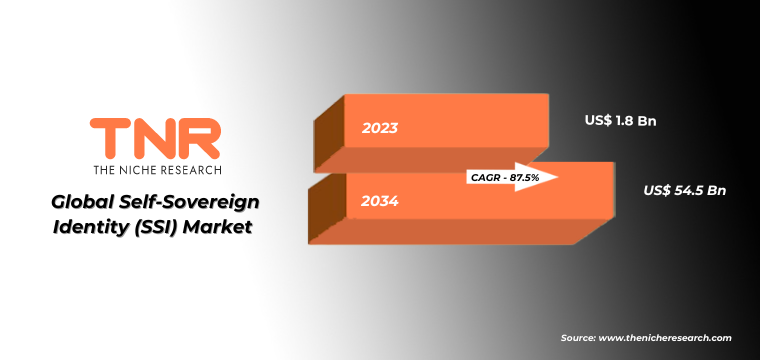
Global Self-Sovereign Identity (SSI) Market Dynamics
Regulatory Compliance Requirements: Regulatory frameworks such as GDPR (General Data Protection Regulation) in Europe and CCPA (California Consumer Privacy Act) in the United States mandate strict requirements for the protection of personal data and user privacy. SSI solutions enable organizations to comply with these regulations by giving individuals greater control over their personal information and ensuring that data is only shared with explicit consent.
Integration of Blockchain Technology: SSI solutions are enabled by blockchain technology, which provides a secure and tamper-proof ledger for recording and verifying identity transactions. Blockchain enables SSI systems to maintain a decentralized and immutable record of identity attributes, ensuring trust and transparency in identity management processes. As blockchain technology matures and becomes more widely adopted, the scalability and interoperability of SSI solutions improve, driving market growth.
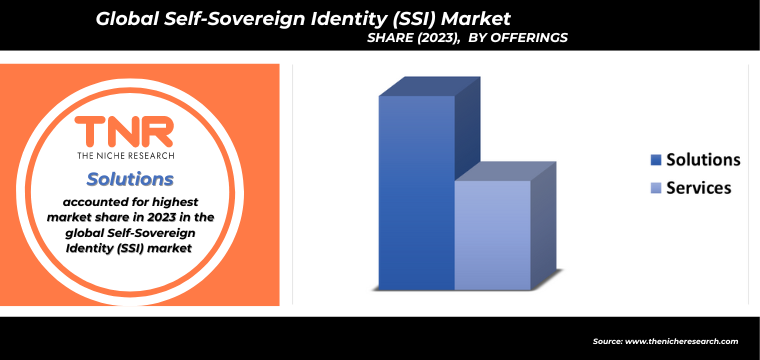
Solutions Segment Dominated the Global Self-Sovereign Identity (SSI) Market During the Forecast Period (2024 – 2034).
Regulatory frameworks such as GDPR (General Data Protection Regulation) and CCPA (California Consumer Privacy Act) mandate strict requirements for the protection of personal data and user privacy. SSI solutions enable organizations to comply with these regulations by giving individuals greater control over their personal information and ensuring that data is only shared with explicit consent. As regulatory scrutiny increases, the demand for SSI solutions that support compliance with data privacy regulations rises.
Organizations are undergoing digital transformation initiatives to modernize operations, improve customer experiences, and enhance security. SSI solutions provide a decentralized and interoperable framework for identity management, enabling seamless and secure authentication and authorization processes in digital ecosystems. As organizations seek to modernize their identity infrastructure and adopt innovative technologies, the demand for SSI solutions increases.
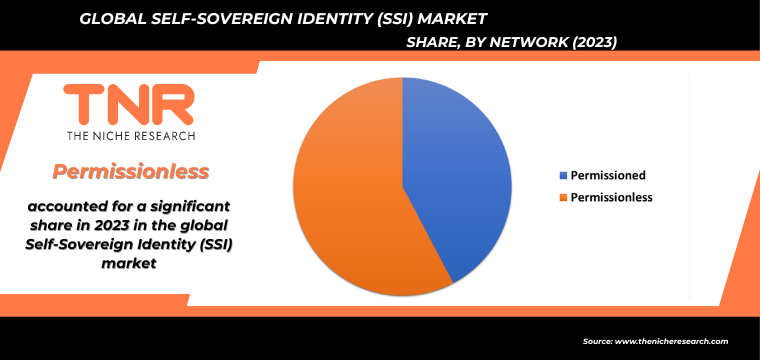
Permissionless Segment had the Highest Share in the Global Self-Sovereign Identity (SSI) Market in 2023.
The concept of “permissionless” in the context of Self-Sovereign Identity (SSI) refers to the ability of individuals to create and manage their digital identities without requiring permission or approval from centralized authorities or intermediaries. In a permissionless SSI system, individuals have full autonomy and control over their identities, allowing them to assert their identity attributes and interact with other parties in a decentralized and peer-to-peer manner. Permissionless SSI solutions align with the principles of decentralization and autonomy, enabling individuals to assert their identities without reliance on centralized authorities or intermediaries. This empowers individuals to control their personal information and decide how it is shared, accessed, and used by others.
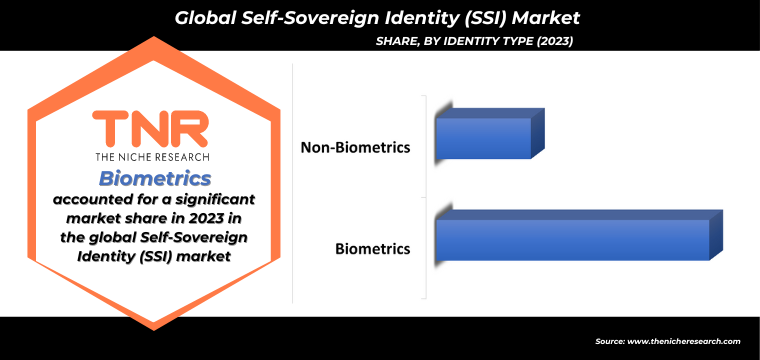
Healthcare Industry Segment had the Highest Share in the Global Self-Sovereign Identity (SSI) Market in 2023.
The healthcare industry segment dominated the global Self-Sovereign Identity (SSI) market, in terms of revenue and is estimated to sustain its dominance over the forecast period. Healthcare organizations are entrusted with sensitive patient data, including medical records, treatment histories, and personal information. Protecting this data from unauthorized access, breaches, and misuse is critical to maintaining patient trust and complying with data privacy regulations such as HIPAA (Health Insurance Portability and Accountability Act).
SSI solutions offer a decentralized and tamper-proof framework for managing patient identities and health records, enhancing security and privacy protections. Healthcare providers often need to share patient data with other healthcare organizations, specialists, insurers, and caregivers to facilitate coordinated care, treatment planning, and billing processes. Traditional identity management systems may hinder interoperability and data sharing due to siloed data and incompatible systems. SSI solutions enable seamless and secure data sharing between authorized parties while preserving patient privacy and consent.
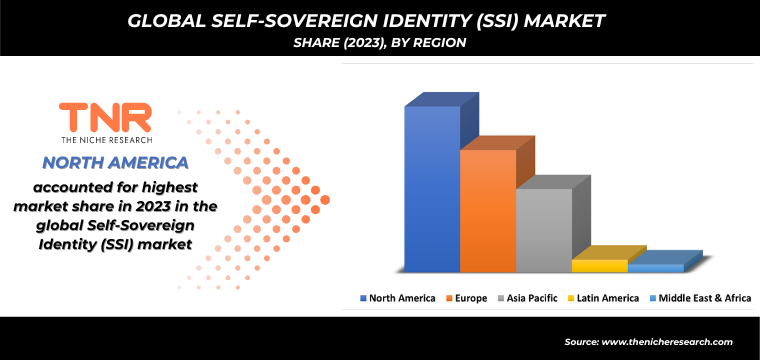
North America has stringent data privacy regulations, such as the Health Insurance Portability and Accountability Act (HIPAA) in the healthcare sector and regulations like the California Consumer Privacy Act (CCPA) and the General Data Protection Regulation (GDPR) for personal data protection. SSI solutions provide individuals with greater control over their personal data and enable organizations to comply with these regulations more effectively. Across various industries in North America, organizations are undergoing digital transformation initiatives to modernize their operations, enhance customer experiences, and improve security.
SSI solutions enable organizations to streamline identity verification processes, enhance data security, and facilitate seamless interactions in digital ecosystems. Governments in North America are increasingly recognizing the potential benefits of SSI solutions for enhancing digital identity management, improving citizen services, and protecting personal data. Initiatives such as the National Strategy for Trusted Identities in Cyberspace (NSTIC) in the United States aim to promote the adoption of secure and privacy-preserving identity solutions, driving demand for SSI technologies.
Competitive Landscape: Global Self-Sovereign Identity (SSI) Market:
- Azelis Holding S.A.
- Barentz B.V.
- Blockchain Helix
- Brenntag AG
- Dock
- Helm AG
- ICC Chemicals, Inc.
- IDEX Biometrics
- Imageware
- Infopulse
- Metadium
- Microsoft
- NEC
- Nexeo Solution Holding LLC
- Omya AG
- Persistent
- TER Group
- Univar Inc.
- Validated ID
- Wipro
- Other Industry Participants
Global Self-Sovereign Identity (SSI) Market: Key Insights
| Report Specifications | Details |
| Market Revenue in 2023 | US$ 1.8 Bn |
| Market Size Forecast by 2034 | US$ 54.5 Bn |
| Growth Rate (CAGR) | 87.5% |
| Historic Data | 2016 – 2022 |
| Base Year for Estimation | 2023 |
| Forecast Period | 2024 – 2034 |
| Report Inclusions | Market Size & Estimates, Market Dynamics, Competitive Scenario, Trends, Growth Factors, Market Determinants, Key Investment Segmentation, Product/Service/Solutions Benchmarking |
| Segments Covered | By Offering, By Identity Type, By Network, By Organization Size, By Industry |
| Regions Covered | North America, Europe, Asia Pacific, Middle East & Africa, Latin America |
| Countries Covered | U.S., Canada, Mexico, Rest of North America, France, The UK, Spain, Germany, Italy, Nordic Countries (Denmark, Finland, Iceland, Sweden, Norway), Benelux Union (Belgium, The Netherlands, Luxembourg), Rest of Europe, China, Japan, India, New Zealand, Australia, South Korea, Southeast Asia (Indonesia, Thailand, Malaysia, Singapore, Rest of Southeast Asia), Rest of Asia Pacific, Saudi Arabia, UAE, Egypt, Kuwait, South Africa, Rest of Middle East & Africa, Brazil, Argentina, Rest of Latin America |
| Key Players | Azelis Holding S.A., Barentz B.V., Blockchain Helix, Brenntag AG, Dock, Helm AG, ICC Chemicals, Inc., IDEX Biometrics, Imageware, Infopulse, Jebsen & Jessen Offshore Pte. Ltd., Metadium, Microsoft, NEC, Nexeo Solution Holding LLC, Omya AG, Other Industry Participants,Persistent,TER Group ,Univar Inc., Validated ID, Wipro, Other Industry Participants |
| Customization Scope | Customization allows for the inclusion/modification of content pertaining to geographical regions, countries, and specific market segments. |
| Pricing & Procurement Options | Explore purchase options tailored to your specific research requirements |
| Contact Details | Consult With Our Expert
Japan (Toll-Free): +81 663-386-8111 South Korea (Toll-Free): +82-808- 703-126 Saudi Arabia (Toll-Free): +966 800-850-1643 United Kingdom: +44 753-710-5080 United States: +1 302-232-5106 E-mail: askanexpert@thenicheresearch.com
|
Global Self-Sovereign Identity (SSI) Market
By Offering
- Solutions
- Services
By Identity Type
- Biometrics
- Non-Biometrics
By Network
- Permissioned
- Permissionless
By Organization Size
- SMEs
- Large Enterprises
By Industry
- Banking, Financial Services and Insurance (BFSI)
- IT and Telecom
- Government
- Real Estate & Construction
- Healthcare
- Retail and E-Commerce
- Media & Entertainment
- Travel & Hospitality
- Others
By Region
- North America (U.S., Canada, Mexico, Rest of North America)
- Europe (France, The UK, Spain, Germany, Italy, Nordic Countries (Denmark, Finland, Iceland, Sweden, Norway), Benelux Union (Belgium, The Netherlands, Luxembourg), Rest of Europe)
- Asia Pacific (China, Japan, India, New Zealand, Australia, South Korea, Southeast Asia (Indonesia, Thailand, Malaysia, Singapore, Rest of Southeast Asia), Rest of Asia Pacific)
- Middle East & Africa (Saudi Arabia, UAE, Egypt, Kuwait, South Africa, Rest of Middle East & Africa)
- Latin America (Brazil, Argentina, Rest of Latin America)
Report Layout:
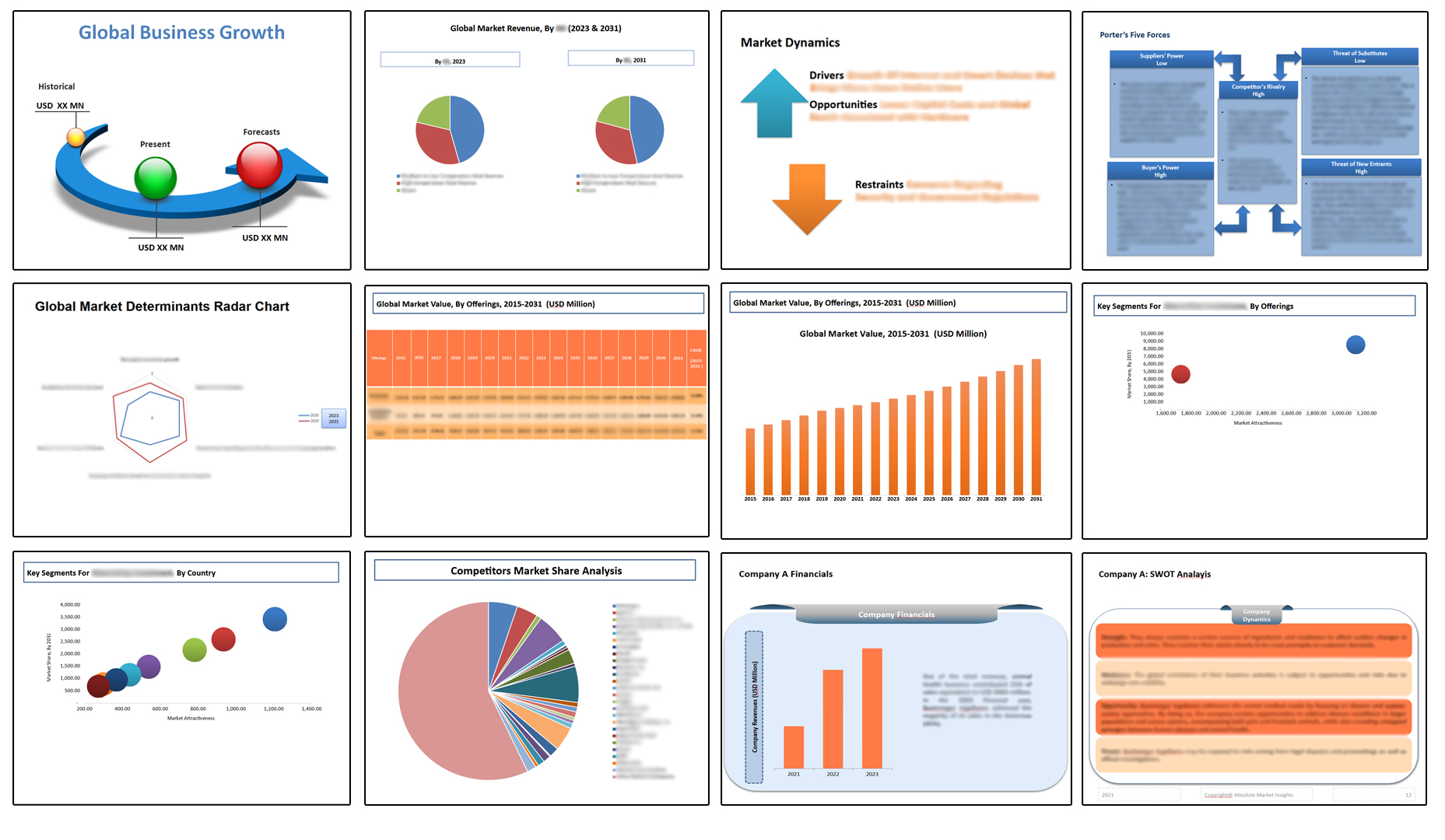
Table of Contents
**Exclusive for Multi-User and Enterprise User.
Global Self-Sovereign Identity (SSI) Market
By Offering
- Solutions
- Services
By Identity Type
- Biometrics
- Non-Biometrics
By Network
- Permissioned
- Permissionless
By Organization Size
- SMEs
- Large Enterprises
By Industry
- Banking, Financial Services and Insurance (BFSI)
- IT and Telecom
- Government
- Real Estate & Construction
- Healthcare
- Retail and E-Commerce
- Media & Entertainment
- Travel & Hospitality
- Others
By Region
- North America (U.S., Canada, Mexico, Rest of North America)
- Europe (France, The UK, Spain, Germany, Italy, Nordic Countries (Denmark, Finland, Iceland, Sweden, Norway), Benelux Union (Belgium, The Netherlands, Luxembourg), Rest of Europe)
- Asia Pacific (China, Japan, India, New Zealand, Australia, South Korea, Southeast Asia (Indonesia, Thailand, Malaysia, Singapore, Rest of Southeast Asia), Rest of Asia Pacific)
- Middle East & Africa (Saudi Arabia, UAE, Egypt, Kuwait, South Africa, Rest of Middle East & Africa)
- Latin America (Brazil, Argentina, Rest of Latin America)
The Niche Research approach encompasses both primary and secondary research methods to provide comprehensive insights. While primary research is the cornerstone of our studies, we also incorporate secondary research sources such as company annual reports, premium industry databases, press releases, industry journals, and white papers.
Within our primary research, we actively engage with various industry stakeholders, conducting paid interviews and surveys. Our meticulous analysis extends to every market participant in major countries, allowing us to thoroughly examine their portfolios, calculate market shares, and segment revenues.
Our data collection primarily focuses on individual countries within our research scope, enabling us to estimate regional market sizes. Typically, we employ a bottom-up approach, meticulously tracking trends in different countries. We analyze growth drivers, constraints, technological innovations, and opportunities for each country, ultimately arriving at regional figures.Our process begins by examining the growth prospects of each country. Building upon these insights, we project growth and trends for the entire region. Finally, we utilize our proprietary model to refine estimations and forecasts.
Our data validation standards are integral to ensuring the reliability and accuracy of our research findings. Here’s a breakdown of our data validation processes and the stakeholders we engage with during our primary research:
- Supply Side Analysis: We initiate a supply side analysis by directly contacting market participants, through telephonic interviews and questionnaires containing both open-ended and close-ended questions. We gather information on their portfolios, segment revenues, developments, and growth strategies.
- Demand Side Analysis: To gain insights into adoption trends and consumer preferences, we reach out to target customers and users (non-vendors). This information forms a vital part of the qualitative analysis section of our reports, covering market dynamics, adoption trends, consumer behavior, spending patterns, and other related aspects.
- Consultant Insights: We tap into the expertise of our partner consultants from around the world to obtain their unique viewpoints and perspectives. Their insights contribute to a well-rounded understanding of the markets under investigation.
- In-House Validation: To ensure data accuracy and reliability, we conduct cross-validation of data points and information through our in-house team of consultants and utilize advanced data modeling tools for thorough verification.
The forecasts we provide are based on a comprehensive assessment of various factors, including:
- Market Trends and Past Performance (Last Five Years): We accurately analyze market trends and performance data from preceding five years to identify historical patterns and understand the market’s evolution.
- Historical Performance and Growth of Market Participants: We assess the historical performance and growth trajectories of key market participants. This analysis provides insights into the competitive landscape and individual company strategies.
- Market Determinants Impact Analysis (Next Eight Years): We conduct a rigorous analysis of the factors that are projected to influence the market over the next eight years. This includes assessing both internal and external determinants that can shape market dynamics.
- Drivers and Challenges for the Forecast Period:Identify the factors expected to drive market growth during the forecast period, as well as the challenges that the industry may face. This analysis aids in deriving an accurate growth rate projection.
- New Acquisitions, Collaborations, or Partnerships: We keep a close watch on any new acquisitions, collaborations, or partnerships within the industry. These developments can have a significant impact on market dynamics and competitiveness.
- Macro and Micro Factors Analysis:A thorough examination of both macro-level factors (e.g., economic trends, regulatory changes) and micro-level factors (e.g., technological advancements, consumer preferences) that may influence the market during the forecast period.
- End-User Sentiment Analysis: To understand the market from the end-user perspective, we conduct sentiment analysis. This involves assessing the sentiment, preferences, and feedback of the end-users, which can provide valuable insights into market trends.
- Perspective of Primary Participants: Insights gathered directly from primary research participants play a crucial role in shaping our forecasts. Their perspectives and experiences provide valuable qualitative data.
- Year-on-Year Growth Trend: We utilize a year-on-year growth trend based on historical market growth and expected future trends. This helps in formulating our growth projections, aligning them with the market’s historical performance.
Research process adopted by TNR involves multiple stages, including data collection, validation, quality checks, and presentation. It’s crucial that the data and information we provide add value to your existing market understanding and expertise. We have also established partnerships with business consulting, research, and survey organizations across regions and globally to collaborate on regional analysis and data validation, ensuring the highest level of accuracy and reliability in our reports.









